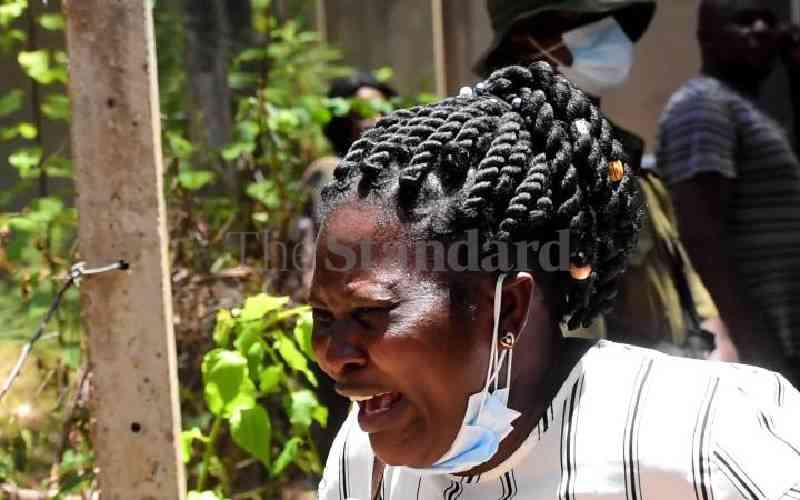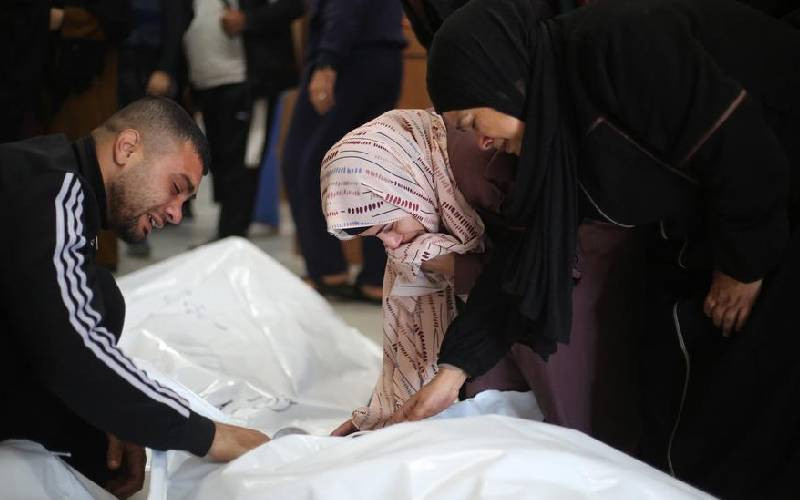The former National Lands Commission deputy director of investigations who died at a Nairobi restaurant on Tuesday was an acclaimed document examiner who nailed key masterminds of the 1994 Rwandan genocide.
Hotel staff say he collapsed on his way to a restroom.
Antipas Nyanjwa's eyes scanned practically every major piece of evidence disputed by accused persons or advanced by the prosecution involving big criminal files locally and regionally.
As an expert witness, Nyanjwa’s opinion weighed heavily on matters at hand, often turning tables on prosecution and defense alike.
On June 21, 2004, Nyanjwa showed up at the Arusha’s International Criminal Tribunal for Rwanda courtroom.
On the dock was the infamous “Chief Organiser of the Killings”, Theoneste Bagosora, accused of co-authoring a document where Tutsi’s were referred to as the principal enemy, a document that was widely distributed within the army.
“At that time, the Chamber admitted as Prosecution Exhibit 278 the witness' expert report on the authorship of certain disputed documents based on his comparison of known writing samples with other documents allegedly written by the Accused,” documents from the ICTR archives say.
Nyanjwa had received the documents from Fatou Bensouda, a prosecutor at the ICTR on May 18 of that year.
They included known handwritings of Bagosora. When he left the witness box, Bagosora’s defence raised issues concerning the size of his samples as well as his use of copies of documents in the place of originals.
The prosecution too wanted to recall him but the judges rejected these requests. Nyanjwa's testimony proved decisive for Bagosora was later sentenced to life imprisonment.
Locally, Nyanjwa was a constant feature in trials involving big-time fraud. In 2017, he prepared a report for the NLC where he exposed fraudsters targeting parcels of land in upmarket Nairobi previously owned by expatriates and settlers.
In the matter involving the Karen land formerly owned by Roger Bryan Robson, Nyanjwa said “this can be explained and confirmed by the inaction of the police on the several reported cases of similar nature especially in Nairobi involving land in prime zones.”
Nyanjwa wanted the report shared with the NLC chairman and the Lands CS for them to “come up with a permanent solution to this menace fast gaining ground as a forceful takeover of private property and cannot and should not be entertained in a functional government.”
He claimed that all the disputed signatures (selling the properties) in the Roger matter were all forgeries as they fundamentally differed in all the characteristics from Roger’s style of writing.
Stay informed. Subscribe to our newsletter
“His name has even wrong spelling on his letter of resignation which is unusual.”
In yet another controversial matter relating to government possession of a Roysambu land belonging to a Mr Mayer Jacob Samuels, Nyanjwa faulted the military, falling short of siding with the petitioners, former workers of Mr Mayer, allegedly evicted by government officers.
He found that although the government had in 1985 proposed to compulsorily acquire the land to set up the Kenya Army school, its Sh3.5 million value for the property was disputed by the estate of the owner, with the court later ruling that it pays Sh23 million instead.
He found zero evidence that the government ever paid the money as it appealed, finding that it sought time to negotiate out of court sometimes in 1997, and went silent on it.
Moreover, the military had, in its own words, claimed it did not have even the Sh3.5 million let alone the Sh23 million.
Life was not always smooth for Nyanjwa though.
On November 28, 2008, and together with his wife Violet Akinyi, was accosted by thugs as he drove into his Nubian estate home in Kisumu town. He was cut at the back of his head and beaten into losing consciousness, waking up at Aga Khan hospital four days later.
He had to be airlifted to Nairobi for further treatment. His wife was also hurt in the attack where they lost money and valuables.
She was treated and discharged on the same day. Two people were later convicted for the robbery with violence but later acquitted on appeal.
He had a Master of Arts degree in criminology and forensic science.
Nyanjwa at glance
- Left the DCI in 2018 to join NLC as the head of investigations to sort out issues of forged titles and deeds.
- Served as the chief document examiner at DCI before that.
- Was among very well-trained experts on handwriting and later taught at CID training school.
- Lived a quiet life and was hardly seen in the public limelight save for the few times when he served as the NLC head of investigations.
- Last public appearance was earlier in the month when he joined other senior NLC staff at a mortuary in Nairobi following the death of NLC communication officer Jennifer Wambua.
- At DCI, nearly all major cases touching on fraud had to go through his hands, as the final authority in detecting forged signatures on documents.
- Those who served with Antipas at the DCI described him as a social and very intelligent officer.
 The Standard Group Plc is a
multi-media organization with investments in media platforms spanning newspaper
print operations, television, radio broadcasting, digital and online services. The
Standard Group is recognized as a leading multi-media house in Kenya with a key
influence in matters of national and international interest.
The Standard Group Plc is a
multi-media organization with investments in media platforms spanning newspaper
print operations, television, radio broadcasting, digital and online services. The
Standard Group is recognized as a leading multi-media house in Kenya with a key
influence in matters of national and international interest.
 The Standard Group Plc is a
multi-media organization with investments in media platforms spanning newspaper
print operations, television, radio broadcasting, digital and online services. The
Standard Group is recognized as a leading multi-media house in Kenya with a key
influence in matters of national and international interest.
The Standard Group Plc is a
multi-media organization with investments in media platforms spanning newspaper
print operations, television, radio broadcasting, digital and online services. The
Standard Group is recognized as a leading multi-media house in Kenya with a key
influence in matters of national and international interest.








